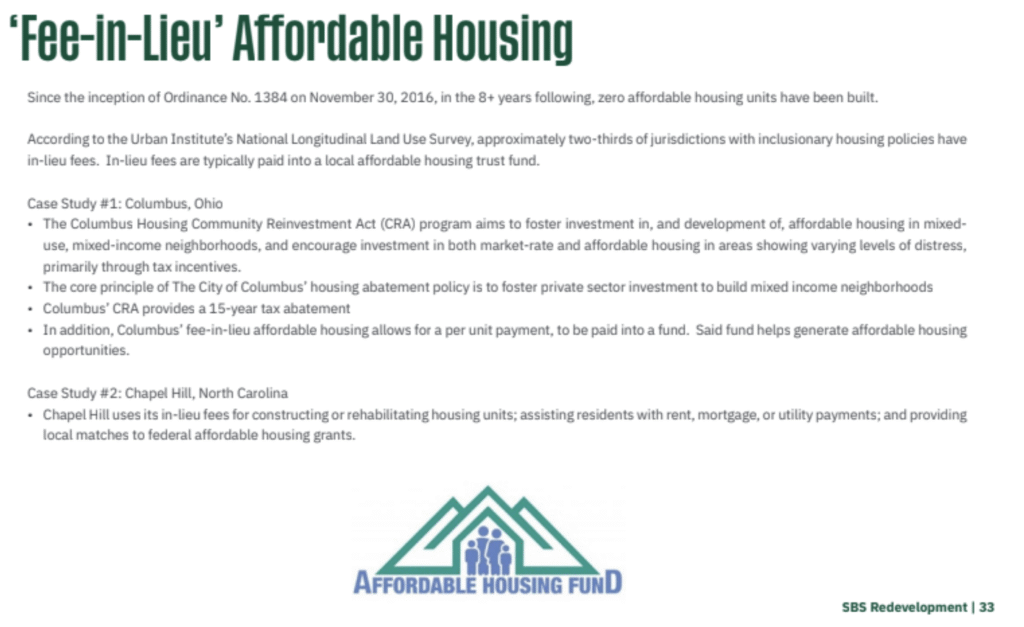A Longtime East Lansing Business Owner Wants to Build Housing Downtown. First the City Will Have to Change its Policies.
The owners of the Student Book Store downtown are proposing their site be transformed to a massive 14-story, approximately 325-unit apartment complex that includes space for commercial businesses.
The Ballein family – which has owned and operated the Student Book Store since 1960 – is proposing the development. Greg Ballein said the complex would be named “The Howard” after his late father. Ballein said the development is needed to house the growing population of Michigan State University students and the additional tax revenue generated at the site would help address the city’s ongoing financial challenges.

City policies, however, may prevent the proposal from materializing.
The city adopted Ordinance 1384 in 2016, creating special use standards for the downtown area. In the ordinance, the city mandates that 25% of all mixed-use housing complexes be dedicated to low- and moderate-income housing or another audience “that would add diversity to the area.” The criteria is common in communities like East Lansing, as similar policies exist in college towns like Madison, Wisconsin, Ann Arbor and Columbus, Ohio.
Ballein belives the ordinance is stifling the possibility of housing projects downtown and is not delivering on its goal of adding affordable units. While there have been a couple of large apartment complexes built downtown since 2016 — Newman Lofts and The Abbot — neither has brought affordable units.
Newman Lofts opened in 2019 and met ordinance requirements by promising housing for people 55 and older. The Abbot apartments opened in 2020 and developers agreed to build another complex nearby that would sell affordable units. Development on the affordable complex, however, has stalled.
The burden to come up with funding for such a project, Ballein says, is prohibitive and a major reason why so few developers have constructed downtown housing since 2016.
Ballein explained that in order to secure loans necessary to fund large housing projects, developers have to convince funders that they will be able to run a successful business using the money. Banks rely on a variety of metrics like the average area income and population studies to determine if they will loan money. Requiring 25% of units in a large project be dedicated to low-to-moderate income renters (or another category to meet ordinance requirements) can cause banks to deny loan requests.
Ballein is proposing the city implement a fee-in-lieu program for those hoping to develop properties in downtown East Lansing. The program creates a fund developers would pay into if they are unable to meet the 25% diverse housing requirement.

The city could then use this money to carry out its housing goals. Cities have used money from fee-in-lieu programs to create affordable housing funds that are used to help usher in affordable developments, on home repair assistance programs, and rental and mortgage assistance programs.
“Instead of providing for the 25%,” Ballein said, “I would provide X amount of dollars that could be used in the future, a future development. We could use those funds strategically.
“We could use it for doing a rental buyback program,” Ballein continued. “Maybe we buy that house…take the rental license off it, rehab it, and then resell it at less than what we paid for it [with] all the renovation costs, but understanding that that’s what I’m using our money for, is converting the neighborhoods back to being neighborhoods.”
Ballein is critical of the City Council’s hesitancy to approve developments.
“We have a university that’s growing at 500 students a year,” he said. “They’ve averaged that for 40 years here. In order for us to keep up with the demand for student housing over there on campus, we’d have to build a project like my proposed project, one a year just to keep up with it. And we’re so far behind that it’s ludicrous.”

An attorney speaking on Ballein’s behalf at the July 15 City Council meeting said that if the development comes to fruition, it would generate nearly $58 million in revenue for the city over a 20-year period. Conversely, if the Student Book Store site stays as is, it would generate just $2.7 million over the same period.
Ballein thinks that the city could address its financial challenges by encouraging new developments, instead of asking voters to approve new taxes, like the Parks and Recreation millage that will be voted on at November’s election.
“We don’t want to lose our Parks and Rec, so what are our options?” Ballein asked. “We need to find ways to bring income into the community or we need to vote for the millage. Yeah, I’d much rather find ways to bring money into the community than tax us even more so that’s my proposal.”
City leaders started discussing Ballein’s plan in July, beginning with the Planning Commission which received a letter from City Manager Robert Belleman asking the body to look into a fee in lieu program. Ballein said that he has met with Belleman to discuss his idea.
Belleman asked the Planning Commission to consider four issues, among them the creation of a fee in lieu to meet “the diverse housing requirement and establish the value for each required unit at a percentage of constructing and/or managing this diverse housing requirement.” He also shared copies of Ballein’s plans.
Over the span of two meetings, the Planning Commission has questioned Ballein, his lawyer and Principal Planner Landon Bartley and discussed the tenets of the fee in lieu proposal. As of this writing, they have not yet delivered a recommendation to be considered by City Council.
If his plan doesn’t win approval from council, Ballein said he would rent the Student Book Store space out, as the business has seen a significant downturn in recent years.
“Then it wouldn’t get reassessed and the city wouldn’t benefit from those tax dollars,” he said. “And that’s okay. That’s their decision to make, but I think it’d be shortsighted and I think it would be a mistake for our entire community.
“The clock’s ticking.”

